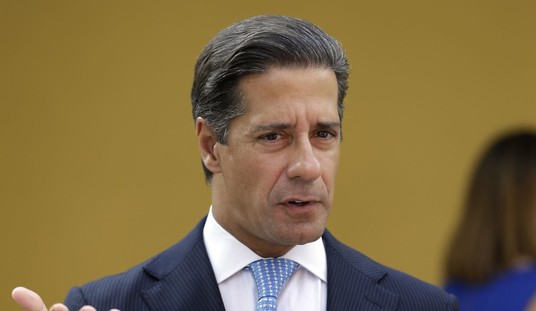John Bercow may be best known in the US for his delightful calls of “Orrrr-DERRRRRR!” on the floor of Parliament, but he made news this morning for an out-of-order ruling. The House of Commons speaker ruled a revote on Boris Johnson’s Brexit deal improper after Saturday’s vote, in which the Commons explicitly refused to authorize the deal until it gets the enabling legislation. “In substance,” Bercow ruled, the new motion was identical to Saturday’s vote on the Letwin amendment:
The Commons Speaker has refused a government request to hold a “yes” or “no” vote on its Brexit deal.
John Bercow said a motion on the deal had already been brought before MPs on Saturday, and it would be “repetitive and disorderly” to debate it again. …
He cited Parliament’s rulebook, Erskine May, which says a motion that is the same “in substance” as a previous one cannot be brought back to the Commons during the course of a single parliamentary session.
The Speaker also said the circumstances around the motion had not changed, so his ruling was “necessary… to ensure the sensible use of the House’s time and proper respect for the decisions that it takes”.
Boris Johnson had hoped to get one last shot at a vote on the broad strokes of the agreement for at least one of two reasons. Had he gotten it through Parliament, Johnson could have claimed to have achieved Brexit, even if it took several weeks longer to implement. Or, just a tad more conspiratorially, Johnson could have used the passage to ask for the withdrawal of the Benn Act letter that requested the extension, and then simply stalled past October 31 to create a default no-deal Brexit without any of the concessions in his latest deal.
That option is now moot, unless the EU decides not to give Johnson an extension and allows him to execute his no-deal strategy. That seems very unlikely, although France has been openly griping about the idea of a new extension. Johnson’s attempt to sour prospects for the extension by not signing the Benn Act letter — and sending a personal note arguing against it — had “no consequences” for the EU’s consideration of an extension, Donald Tusk commented over the weekend.
Germany’s finance minister agreed with Tusk and said the extension was all but guaranteed:
The unconventional “form” of Boris Johnson’s extension request is irrelevant to the EU, the European commission has confirmed, as Germany’s finance minister said “it goes without saying” that a further Brexit delay would be granted.
Peter Altmaier, a key ally of the German chancellor, Angela Merkel, said he believed either a technical extension to allow extra-time for legislation to pass, or a longer period to accommodate a general election or second referendum would be offered.
“We have already twice agreed to an extension. I have repeatedly said as my own opinion I am not ideologically opposed to extending again a few days or a few weeks if you then certainly get a good solution that excludes a hard Brexit”, Altmaier said.
”If the British are to opt for one of the longer-term options, that is new elections or a new referendum, then it goes without saying that the European Union should do it, for me anyway.”
On top of that, the first ministers of the parliaments in Wales and Scotland sent their own letters imploring the EU to extend the Article 50 deadline. Even if this deal passes, Mark Drakeford and Nicola Sturgeon wrote, their legislatures will need time to implement it before being cut off from the EU:
Today @NicolaSturgeon and I have written a joint letter to the PM urging UK Gov to secure an extension from the European Council that respects devolution and allows our legislatures to carry out their proper constitutional and democratic functions. pic.twitter.com/oKoJ8je8tE
— Mark Drakeford (@fmwales) October 21, 2019
With ten days to go until the Brexit deadline of October 31st, Mr Drakeford said Parliament could “not in any way adequately undertake the scrutiny of the Bill in 1 0 day period”.
“This is a concern we fully share. It is simply impossible for us to fulfil our constitutional responsibilities in this timescale.
“An extension would allow us to adequately scrutinise the agreement.”
Both also penned a letter to Johnson, in which they describe his deal as “even more damaging” than Theresa May’s Withdrawal Agreement. That doesn’t bode well for the unity of the United Kingdom after Brexit of either kind:
Today @NicolaSturgeon and I have written a joint letter to the PM urging UK Gov to secure an extension from the European Council that respects devolution and allows our legislatures to carry out their proper constitutional and democratic functions. pic.twitter.com/oKoJ8je8tE
— Mark Drakeford (@fmwales) October 21, 2019
Even an extension won’t be the worst possible outcome for Johnson, although it’s hardly optimal and would be a serious tactical loss. It could set up a national snap election on the basis of either this deal or a no-deal Brexit, if the EU offers a long enough extension. As long as Labour leaves Jeremy Corbyn in charge as potential PM, Johnson has a significant advantage, and his determination to fulfill the original referendum decision will no doubt give Tories a boost as well.
However, this might well be a Pyrrhic victory, assuming it plays out Johnson’s way at all. The warning signals from Scotland and Wales strongly suggest that the flames of nationalism fanned by Johnson and his Brexiters might have already gone too far to keep the United Kingdom’s four nations, well, united. His deal undermined the Unionist identity in Northern Ireland as well by dropping a border in the Irish Sea, leaving them feeling betrayed and demoralized. The end result of Brexit might well be a united Ireland and a disunited kingdom across the Irish Sea border within a decade or less. Such are the risks of nationalism and reclaimed sovereignty in a country that advertises itself as a union of four nations.
Update: This was an ugly surprise for some, and almost certainly a deal-killer in Parliament:
Northern Irish businesses will have to complete exit declarations when sending goods to Great Britain under the terms of the government’s Brexit deal, Stephen Barclay said today.
The U.K. Brexit secretary told peers on the House of Lords European Union committee: “The exit summary declarations will be required in terms of NI to GB.”
Barclay was correcting an earlier answer he gave to the committee, when he said he did not think such forms would be required under Johnson’s deal. Barclay initially told peers: “We’ve said in terms of [trade] from NI to GB that it will be frictionless and so there wouldn’t be [declaration forms].”
Barclay’s admission reveals that trade between Great Britain and Northern Ireland would be subject to new paperwork under the terms of Johnson’s Brexit deal.
In other words, that border in the Irish Sea to which Johnson agreed in this deal is a real customs border, which is … inevitable with Brexit. Pulling out of a customs and regulatory union requires a border; the only question is where it goes. The EU wouldn’t countenance it in Ireland, and the Good Friday Agreement forbids it, so Johnson put it in the only place left to him — a move that even Theresa May tried to forestall with the backstop.
Nigel Farage is furious:
Goods going from Northern Ireland to the rest of the UK would need export declaration forms.
It’s now clear that @BorisJohnson is prepared to wreck the United Kingdom to get this EU treaty through.
No wonder the DUP are unhappy. https://t.co/b6rjWyi8TU
— Nigel Farage (@Nigel_Farage) October 21, 2019
Brexit itself will eventually wreck the UK, but Farage is correct in arguing that this will expedite matters considerably. If Northern Ireland is no longer British, then why shouldn’t it just be Irish?
Update: Jacob Rees-Mogg told Parliament that the enabling legislation will be ready for a vote in three days, allowing for full approval in accord with the Letwin amendment:
If the bill passes second reading tomorrow – the first key vote on it – MPs will then get the chance to vote on the programme motion setting out this accelerated timetable.
— Heather Stewart (@GuardianHeather) October 21, 2019
The revelation about Northern Ireland will likely kill this deal, however. The DUP won’t vote for it, and it might lose the handful of Labour MPs that crossed over on the Letwin vote. Tomorrow’s vote will make that clear one way or the other.








Join the conversation as a VIP Member